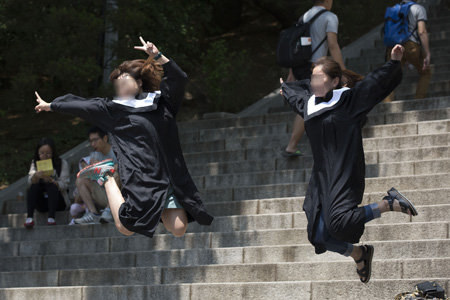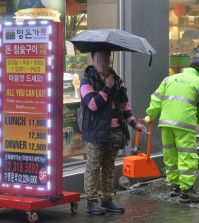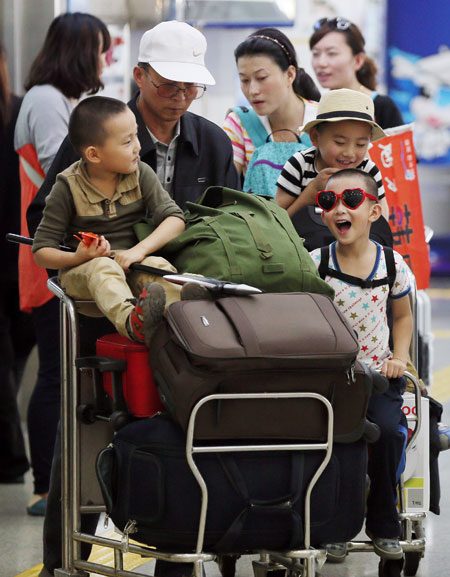- California Assembly OKs highest minimum wage in nation
- S. Korea unveils first graphic cigarette warnings
- US joins with South Korea, Japan in bid to deter North Korea
- LPGA golfer Chun In-gee finally back in action
- S. Korea won’t be top seed in final World Cup qualification round
- US men’s soccer misses 2nd straight Olympics
- US back on track in qualifying with 4-0 win over Guatemala
- High-intensity workout injuries spawn cottage industry
- CDC expands range of Zika mosquitoes into parts of Northeast
- Who knew? ‘The Walking Dead’ is helping families connect
Ewha Womans University besieged by Chinese tourists

Chinese tourists jump for a photograph on Ewha Womans University campus in Seoul, Monday. (Korea Times photo by Choi Won-suk)
By Jhoo Dong-chan
A growing number of Chinese people are visiting Korea this year, and that’s been a bad news for Ewha Womans University students.
Some have clearly crossed the line.
Students have complained that some Chinese visitors even burst into a classroom during school hours, and even take photos of female students’ legs.
“It is not difficult to find Chinese tourists taking photos of good looking students without their consent,” a humanities major, surnamed Lee, said. ”The school was in uproar after a Chinese tourist posted a number of photos of Ewha students in his blog under the headline of ‘female students in Korea.’”
There also are a number of posts at Ewhaian, the school’s online community, complaining about Chinese tourists. One student said: “Chinese tourists enter the main library and make too much noise when they take photos as if it is a tour route.”
Another Lee, a senior majoring in political science, said that it was frustrating when a Chinese tourist entered into the gym and took photos of the girls.
“When Chinese tourists first started to visit the campus several years ago, I felt good. I believed that their visit was a result of the school’s international reputation,” said Lee.
“Now there are too many and they are disturbing. I don’t know if the school is handling the issue seriously.”
After receiving a number of complaints from students, Ewha sent an official note to Chinese tourism authorities and travel agencies at home and abroad, requesting tourists to avoid behavior that can harm the academic atmosphere, such as entering classrooms and taking inappropriate photos.
Despite such complaints, the school has not completely banned Chinese tourists from visiting, probably since they spend a lot of money on school souvenirs such as mugs, hoodies and note books.
“One Chinese tourist spent more than 1 million won ($930) for the school merchandises here,” a school merchandise shop worker said.
An Ewha official said that the sales revenue of the school’s souvenir shop has doubled every month since January due to Chinese tourists.
According to the school, 1,105 Chinese tourists visited the school in February, skyrocketing from 47 in June 2013.
CCTV, China’s state TV broadcaster, showed the school on one of its programs last year, saying the century-old school has raised many female politicians.
Ewha professor Yoo Sung-jin believes that another reason for its popularity comes from its school name Ewha, which means pear blossom.
“The pronunciation of Ewha in Chinese sounds similar to that of ‘leepa,’ a Chinese word meaning fortune and wealth,” Yoo said.













